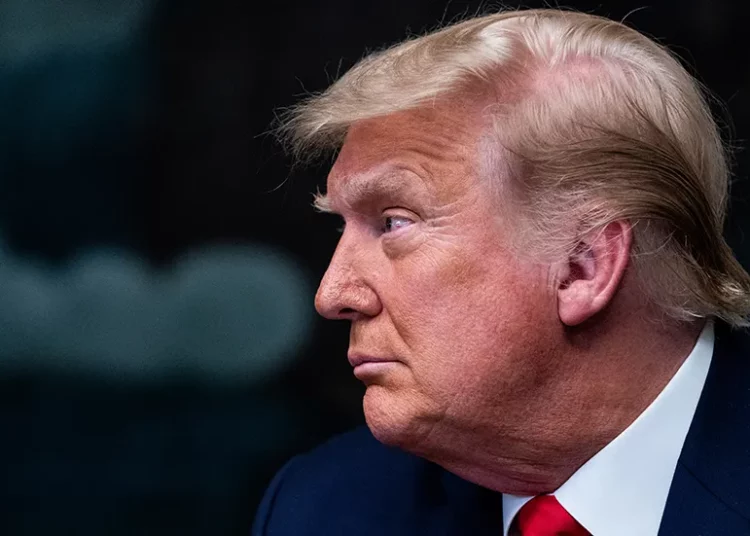Canadian Prime Minister Mark Carney has strategically secured the buy-in of other European Union countries and Japan that own part of the $8.53 trillion foreign countries hold in US debt to lead a coordinated Treasury bond slow bleed, which has forced President Donald Trump to order a 90-day pause on all tariffs while increasing China’s tariff rate to 125%.
In a piece entitled, ‘Carney’s Checkmate: How Canada’s Quiet Bond Play Forced Trump to Drop Tariffs,’ a former Canadian radio personality best known as a long-time “shock jock” morning host on CFNY-FM in Toronto, Ontario, Dean Blundell wrote that Carney and Japan have proved that stopping Trump wasn’t about bravado but about using leverage and a calculated, effective strategy.
LEADERSHIP recalls that President Donald Trump had last Wednesday reduced the new tariff rates on imports from most US trade partners to 10% for 90 days to allow trade negotiations with those countries as he announced the pause hours after goods from nearly 90 nations became subject to stiffer, so-called reciprocal tariffs imposed by the United States.
According to Blundell, when the tariff threats that had the world on edge—125% on China, 25% on Canada’s autos, and a global trade war in the making, Mark Carney, who had been making a deliberate financial manoeuvre by quietly increasing Canada’s holdings of US Treasury bonds—over $350 billion worth by early 2025, part of the $8.53 trillion foreign countries hold in US debt, took his case to Europe for closed-door meetings with the EU’s heavy hitters – Germany, France, the Netherlands and Japan – with a pitch: if Trump went too far with tariffs, Canada wouldn’t just retaliate with duties on American cars or steel; it would start offloading those Treasury bonds.
The implication of this is that if countries like Canada, Japan, and the EU start selling bonds together (even slowly) and too many bonds hit the market at once in a scenario where more supply than demand pushes bond prices down, it will have a devastating impact on the US economy.
Blundell writes, “When the tariff threats that had the world on edge—125% on China, 25% on Canada’s autos, a global trade war in the making—suddenly softened – a “pause,” he called it, it is a complete turnaround from the chest-thumping of the past week. And the reason? Mark Carney and a slow, deliberate financial manoeuvre that most people overlooked: the coordinated Treasury bond slow bleed. This wasn’t about bravado. It was about leverage. Cold, calculated, and devastatingly effective.
“While Trump was gearing up his trade war machine, Carney, Canada’s Prime Minister, wasn’t just sitting in Ottawa twiddling his thumbs. He’d been quietly increasing Canada’s holdings of US Treasury bonds—over $350 billion worth by early 2025, part of the $8.53 trillion foreign countries hold in US debt.
“On the surface, it looked like a safe play, a hedge against economic chaos. But it wasn’t just defence. It was a loaded gun. Carney didn’t stop there. He took his case to Europe. Not for photo ops, but for closed-door meetings with the EU’s heavy hitters—Germany, France, the Netherlands. Japan was in the room too, listening closely. The pitch was simple: if Trump went too far with tariffs, Canada wouldn’t just retaliate with duties on American cars or steel. It would start offloading those Treasury bonds. Not a fire sale—nothing so crude. A slow, steady bleed. A signal to the markets that the US dollar’s perch wasn’t so secure.”
Blundell Explains How Treasury Bonds Work And Why A Global Sell-Off Could Tank The US
What are treasury bonds?
They’re IOUs the US government issues to borrow money. Countries, banks, and investors buy them, lending cash to the US. The US promises to pay back the loan with interest over time (e.g., 10 years).
Who owns them?
Foreign countries hold $8.5 trillion of US debt (as of 2025). Big players: Japan ($1 trillion+), Canada ($350 billion), EU nations ($1.5 trillion combined). They buy bonds to park money safely and earn steady interest.
How do they affect the US?
The US uses this borrowed cash to fund everything—military, Social Security, tax cuts. Cheap borrowing keeps the economy humming; the government spends more than it collects in taxes.
What happens in a coordinated sell-off?
If countries like Canada, Japan, and the EU start selling bonds together (even slowly), too many bonds will hit the market at once. Prices will drop, as more supply than demand pushes bond prices down. Interest rates will spike.
Why does this hurt the US?
Borrowing gets expensive: Higher interest rates mean the US pays more. Debt Snowballs: The US already owes $34 trillion; pricier loans make it harder to manage. Dollar Weakens: Selling bonds means dumping dollars, so the currency’s value drops.
How does this cause a depression?
Spending dries up: Government cuts back as borrowing costs soar—fewer jobs, less aid. Businesses tank: Higher rates choke loans; companies can’t expand or hire. Imports cost more: A weaker dollar makes foreign goods (oil, tech) pricier, jacking up inflation. Markets crash: Panic hits stocks and banks as confidence in US debt fades. The domino effect: Jobs vanish, prices spike, savings erode—classic depression triggers. A slow, coordinated sell-off isn’t a bluff; it’s a quiet gut punch that would take the US years to recover.
And Canada wasn’t alone. Japan, holding over $1 trillion in US debt, signed on and started to sell those US Treasury bonds, which scared Trump.
Key EU countries—collectively sitting on another $1.5 trillion—nodded in agreement. This wasn’t a bluff. It was a silent pact. It’s a coordinated move to remind Trump that the free world doesn’t just roll over when he swings his tariff bat. Hurt us, Carney said, and we’ll hurt you—right where it counts. The US Treasury market is the backbone of the global economy. Foreign holders like Canada, Japan, and the EU keep it humming, financing everything from America’s military to its tax cuts. Start selling those bonds in unison, even gradually, and the yields spike. The dollar wobbles. Borrowing costs climb. That’s the message Carney delivered in his call with Trump last week. There are no leaks on the exact words, but the outcome speaks volumes. Trump didn’t just pause the tariffs; he backpedalled hard.
China’s still in the crosshairs—125% duties are no joke—but Canada? The EU? Japan? They’re off the hit list. For now, at least. Why? Because Carney’s play wasn’t noise. It was power.





